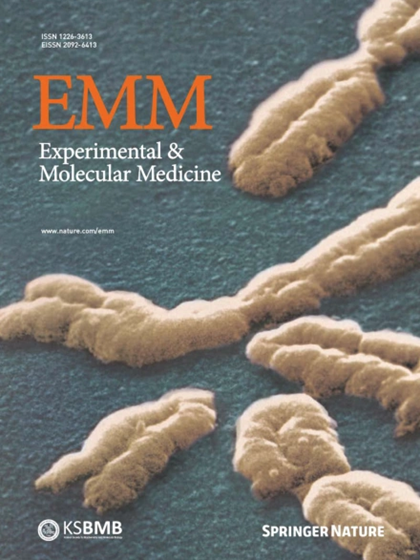肿瘤微环境中巨噬细胞介导的免疫逃避。
IF 9.5
2区 医学
Q1 BIOCHEMISTRY & MOLECULAR BIOLOGY
引用次数: 0
摘要
胞浆形成是一个动态的细胞过程,其特征是在细胞间相互作用过程中质膜和相关细胞质溶胶的交换。与吞噬作用不同,这种转移维持了转移膜分子的表面定位。例如,与抗原提呈细胞结合的CD4 T细胞会发生细胞吞噬,从而促进装载抗原的主要组织相容性复合体(MHC) II类分子从抗原提呈细胞转移到CD4 T细胞。这种转移导致抗原装载MHC II类分子修饰CD4 T细胞的形成。这些被“修饰”的CD4 T细胞随后参与抗原向其他CD4 T细胞的呈递。此外,巨噬细胞增生使受体细胞获得免疫调节分子,如CTLA-4和Tim3,从而调节其抗肿瘤免疫。同时,供体细胞经历质膜的丢失,而大量的丢失可引发肌萎缩细胞病介导的细胞死亡,称为肌萎缩症。本文旨在探讨巨噬细胞分裂介导的免疫调节分子的转移及其在肿瘤微环境中的意义,以阐明癌症中免疫逃避的潜在机制。本文章由计算机程序翻译,如有差异,请以英文原文为准。

Trogocytosis-mediated immune evasion in the tumor microenvironment
Trogocytosis is a dynamic cellular process characterized by the exchange of the plasma membrane and associated cytosol during cell-to-cell interactions. Unlike phagocytosis, this transfer maintains the surface localization of transferred membrane molecules. For example, CD4 T cells engaging with antigen-presenting cells undergo trogocytosis, which facilitates the transfer of antigen-loaded major histocompatibility complex (MHC) class II molecules from antigen-presenting cells to CD4 T cells. This transfer results in the formation of antigen-loaded MHC class II molecule-dressed CD4 T cells. These “dressed” CD4 T cells subsequently participate in antigen presentation to other CD4 T cells. Additionally, trogocytosis enables the acquisition of immune-regulatory molecules, such as CTLA-4 and Tim3, in recipient cells, thereby modulating their anti-tumor immunity. Concurrently, donor cells undergo plasma membrane loss, and substantial loss can trigger trogocytosis-mediated cell death, termed trogoptosis. This review aims to explore the trogocytosis-mediated transfer of immune regulatory molecules and their implications within the tumor microenvironment to elucidate the underlying mechanisms of immune evasion in cancers. Trogocytosis is a process where cells exchange membrane proteins, first noted in the 1970s, and it affects immune responses. Membrane proteins are molecules that help cells communicate and interact. Researchers emphasized its importance in how immune cells interact. This review discusses trogocytosis in the tumor microenvironment, influencing both immune and cancer cells. The study explains that trogocytosis allows cells to “nibble” on others, transferring membrane properties, which can change the function of immune cells like T cells and NK cells. Various methods were used to study these interactions, focusing on immune and cancer cells. Findings indicate that trogocytosis can either suppress or enhance immune responses, affecting cancer therapies such as CAR-T cells. Understanding trogocytosis could improve cancer treatments by adjusting immune responses, and future research might explore its mechanisms to boost immunotherapy. This summary was initially drafted using artificial intelligence, then revised and fact-checked by the author.
求助全文
通过发布文献求助,成功后即可免费获取论文全文。
去求助
来源期刊

Experimental and Molecular Medicine
医学-生化与分子生物学
CiteScore
19.50
自引率
0.80%
发文量
166
审稿时长
3 months
期刊介绍:
Experimental & Molecular Medicine (EMM) stands as Korea's pioneering biochemistry journal, established in 1964 and rejuvenated in 1996 as an Open Access, fully peer-reviewed international journal. Dedicated to advancing translational research and showcasing recent breakthroughs in the biomedical realm, EMM invites submissions encompassing genetic, molecular, and cellular studies of human physiology and diseases. Emphasizing the correlation between experimental and translational research and enhanced clinical benefits, the journal actively encourages contributions employing specific molecular tools. Welcoming studies that bridge basic discoveries with clinical relevance, alongside articles demonstrating clear in vivo significance and novelty, Experimental & Molecular Medicine proudly serves as an open-access, online-only repository of cutting-edge medical research.
 求助内容:
求助内容: 应助结果提醒方式:
应助结果提醒方式:


